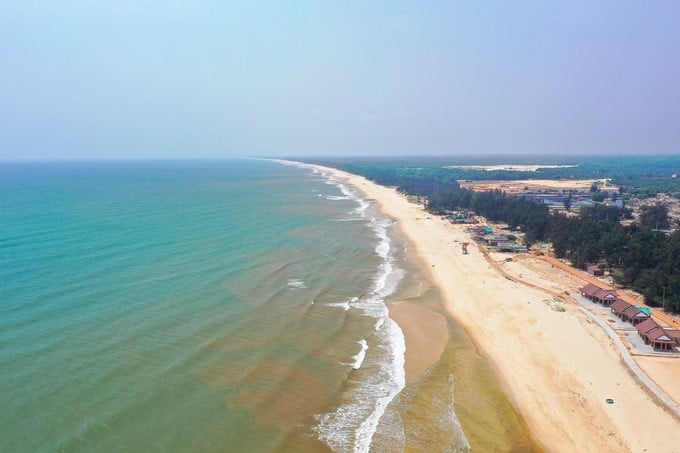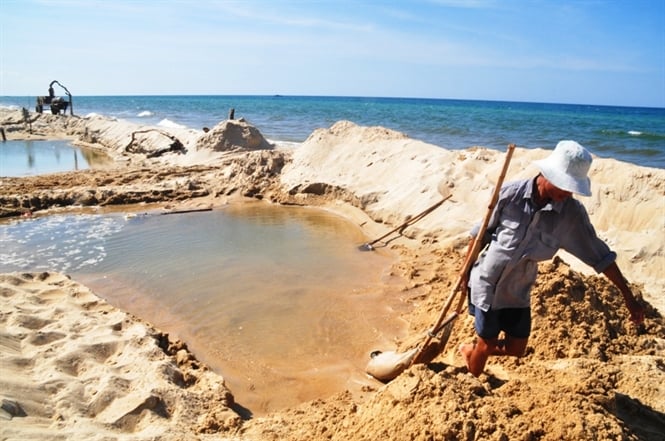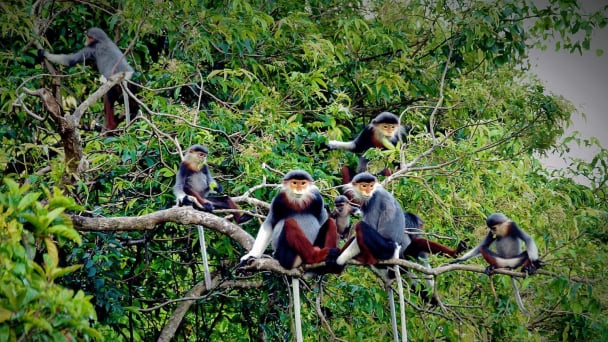May 17, 2025 | 18:51 GMT +7
May 17, 2025 | 18:51 GMT +7
Hotline: 0913.378.918
May 17, 2025 | 18:51 GMT +7
Hotline: 0913.378.918

The use of sea sand as leveling material must not affect the marine environment, marine ecosystem, sea transport, navigation, or aquaculture. Photo: Tung Dinh.
Deputy Tran Kim Yen (Ho Chi Minh City) said that in the context of lacking river sand to implement projects, especially particularly important ones, the plan of using sea sand to replace river sand is one direction. However, if the replacement has conditions that have not been met, mass implementation will be a gamble with the environment.
The deputy asked the Minister to provide immediate and long-term solutions to have enough raw materials for projects without negatively affecting the environment and ensuring water security.
Meanwhile, Deputy Dang Bich Ngoc (Hoa Binh) also raised questions about legislating issues related to leveling materials for key traffic works.
Responding to Deputy Dang Bich Ngoc's question about leveling materials, Minister Dang Quoc Khanh said that with the drastic direction of the Government and the Prime Minister and the consensus of localities, up to now, a specific mechanism for providing leveling materials for key national projects and expressway projects has been implemented.
The Government also issued implementation guidance documents and, at the same time, directed the Ministry of Natural Resources and Environment to issue instructions on construction materials for projects. Thanks to that, as of now, the progress of these projects has met the set requirements.
The Minister affirmed that the special mechanism authorized by the National Assembly has been implemented very effectively. To legislate this content, according to current law, the mine allocation process is the same as for precious metals and has not been classified or grouped.
As for the deputy's question about the plan to use sea sand, the Minister said that using sand materials for key national projects, especially expressways, is very difficult. The Prime Minister has directed relevant ministries and branches to research the use of sea sand. Currently, the Ministry of Transport's pilot project is leveling and building traffic roads. The Ministry of Natural Resources and Environment was assigned the task of assessing the area's reserves for sea sand.

The Soc Trang area is assessed to have immediately available reserves of sea sand of 145 million m3. Photo: TL.
In recent times, the Ministry of Natural Resources and Environment has completed an assessment of reserves in the Soc Trang area, with immediately available reserves of 145 million m3. The Minister said that the reserves are very large, and currently, sea sand has been used for leveling and in economic zones, industrial parks, and coastal projects.
Regarding the deputy's concerns about the risk of salinity, the Minister affirmed that it is necessary to assess the environmental impact and that the best use is in saline areas. Depending on the project, the impact will be assessed on the principle of not affecting surface water. The Ministry of Construction will have specific procedures for each construction project.
After this answer, Deputy Nguyen Ngoc Son (Hai Duong) commented that preserving nature and biodiversity is an important component of the strategy for sustainable development of the marine economy.
According to Deputy Son, sea reclamation and exploitation of sea sand as construction materials will have a great impact on the marine environment, especially the impact of vertical and horizontal currents, leading to the possibility of coastal erosion. Mr. Son asked Minister Dang Quoc Khanh to provide a solution to this situation.
Responding to Deputy Nguyen Ngoc Son's question about the impact of sea sand exploitation on preserving nature and marine biodiversity, Minister of Natural Resources and Environment Dang Quoc Khanh said that Resolution No. 36 of the Party Central Committee on the strategy for sustainable development of Vietnam's marine economy for the 2021–2030 period, with a vision to 2045, clearly stated that the exploitation and use of marine resources must ensure the requirements of environmental protection and sustainable development.
According to the Minister, the sea is a unified whole, and the exploitation and use of marine resources in many industries and fields, as well as investment projects in tourism, industry, and urban areas along the coast, all need to thoroughly assess the impact on the environment, ensuring no impact on the marine environment, marine ecosystem, sea transport, navigation, and aquaculture.
Minister Dang Quoc Khanh said that to solve these overlapping and interference problems, the National Marine Plan has zoning for use and planning and development space orientation associated with the planning of branches and coastal localities. It is necessary to seriously implement planning to solve this problem to both develop the economy and protect the environment.
Translated by Thu Huyen

(VAN) The United Nations designated 22 May as the International Day for Biodiversity 2025 with the theme 'Harmony with nature and sustainable development.'
![Multi-channel, multi-directional Vietnamese agricultural markets: [8] A national strategy is needed](https://t.ex-cdn.com/nongnghiepmoitruong.vn/608w/files/phucpm/2025/05/15/1435-thi-truong-nong-san-viet-da-kenh-da-huongbai-8-can-mot-chien-luoc-quoc-gia-084750_728.jpg)
(VAN) The Chairman of Hung Nhon Group shared: ‘Opening up and tapping into new markets is the right and strategic direction for Vietnam's agricultural sector.’

(VAN) Food waste has become a serious issue in modern society, especially in rapidly urbanizing and developing cities like Hanoi.
![Multi-channel, multi-directional Vietnamese agricultural markets: [7] Deep processing makes global reach easy](https://t.ex-cdn.com/nongnghiepmoitruong.vn/608w/files/huytd/2025/05/16/2946-che-bien-sau-chia-khoa-vang-nang-tam-nong-san-viet-tren-ban-do-the-gioi-080603_110-093858.jpg)
(VAN) The application of deep processing technology is helping Vietnamese agricultural products enhance their value, create competitive advantages, and open doors to conquer global consumers.
![Multi-channel, multi-directional Vietnamese agricultural markets: [6] Agri products go online](https://t.ex-cdn.com/nongnghiepmoitruong.vn/608w/files/content/2024/12/10/1-113313_954.jpg)
(VAN) Bringing agri products onto e-commerce platforms is an effective way to build a brand that many businesses, cooperatives, and agricultural production households are doing.

(VAN) Veterinary training should focus on quality, not just quantity. Veterinarians also need more options to pursue specialized training.

(VAN) The veterinary industry needs to be viewed objectively and further invested in to properly demonstrate its role and importance in the new context.